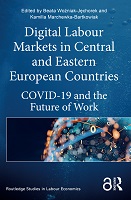Chapter Introduction
Proposal review
Author(s)
Woźniak-Jęchorek, Beata
Marchewka-Bartkowiak, Kamilla
Language
EnglishAbstract
This book focuses on the impact of the COVID-19 pandemic on changing labour
markets and accelerating digitalisation of the workplace in Central and Eastern
Europe. The COVID-19 pandemic disrupted workplaces substantially. As the
lockdowns or stay-at-home measures entered into force, a large proportion of the
workforce was instructed to stay home and continue to work remotely if their
functions made it possible. This policy accelerated the introduction of many digital
solutions, requiring the establishment of new patterns of work, and new institutional
logic guiding daily activity for both organisations and individuals. In a relatively
short time, remote working has become a kind of commonly accepted new
institution with its own new logic, structures, rules, and behaviours (Jacks, 2021).
The trends contributing to a shift towards more flexible, digital working patterns
were emerging before the pandemic (over the last decade) in response to
societal developments, the increasing participation of women, and greater global
competition. In 2020, the combined health and economic shocks have only deepened
the concerns about technology-driven displacement of jobs, growing income
inequality, and rising societal discord towards globalisation.
Keywords
digitalisation; gig economy; labour market; the future of workDOI
10.4324/9781003326779-1ISBN
9781032354118, 9781032354125, 9781003326779Publisher
Taylor & FrancisPublisher website
https://taylorandfrancis.com/Publication date and place
2023Imprint
RoutledgeSeries
Routledge Studies in Labour Economics,Classification
Economics
Labour / income economics


 Download
Download